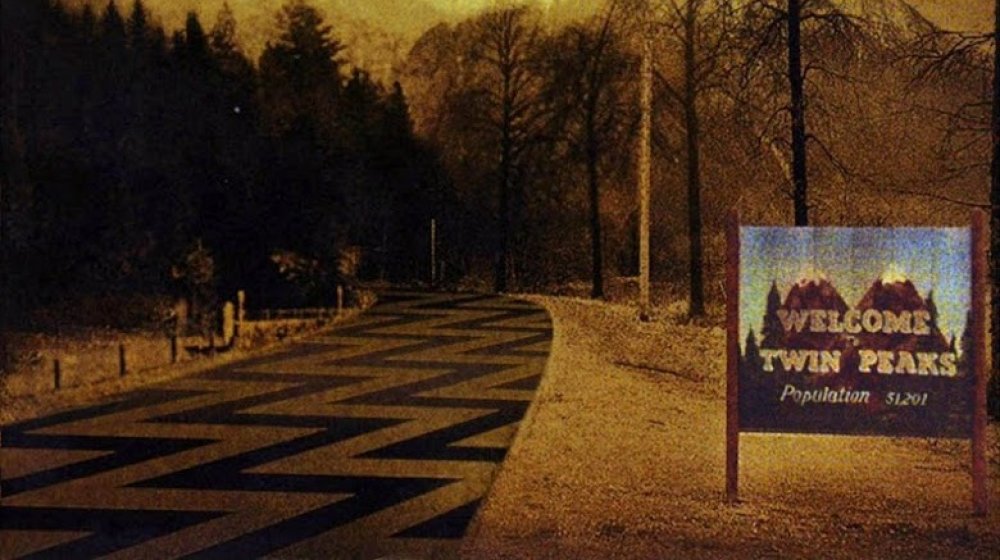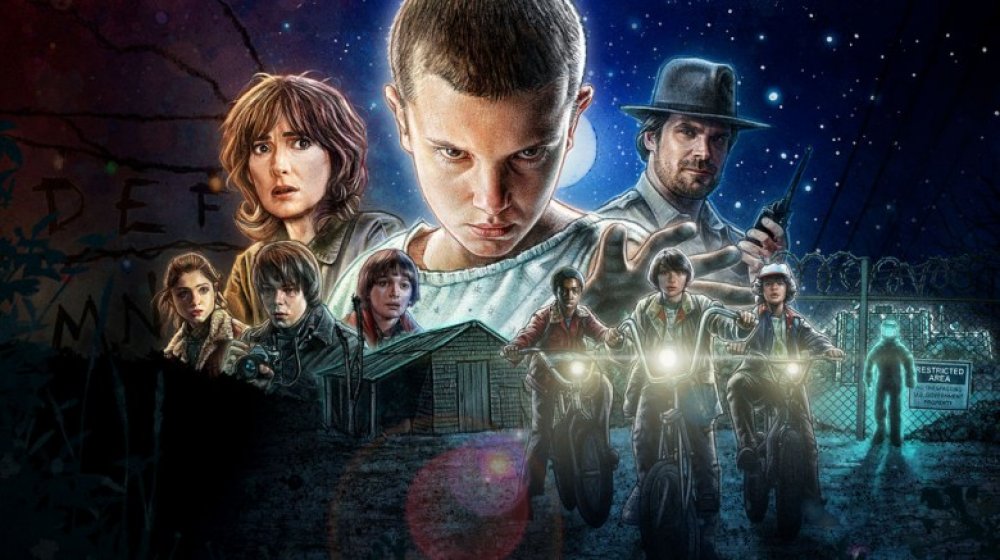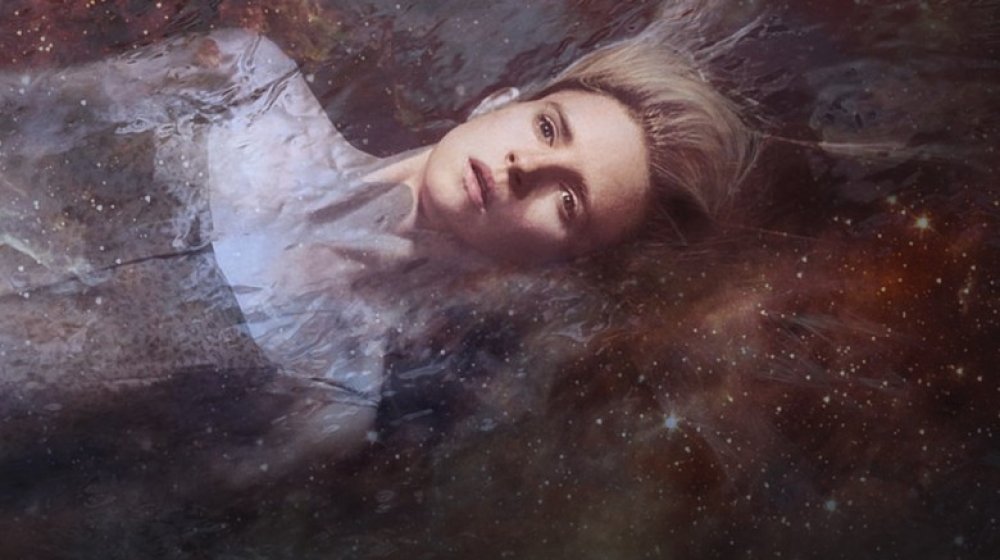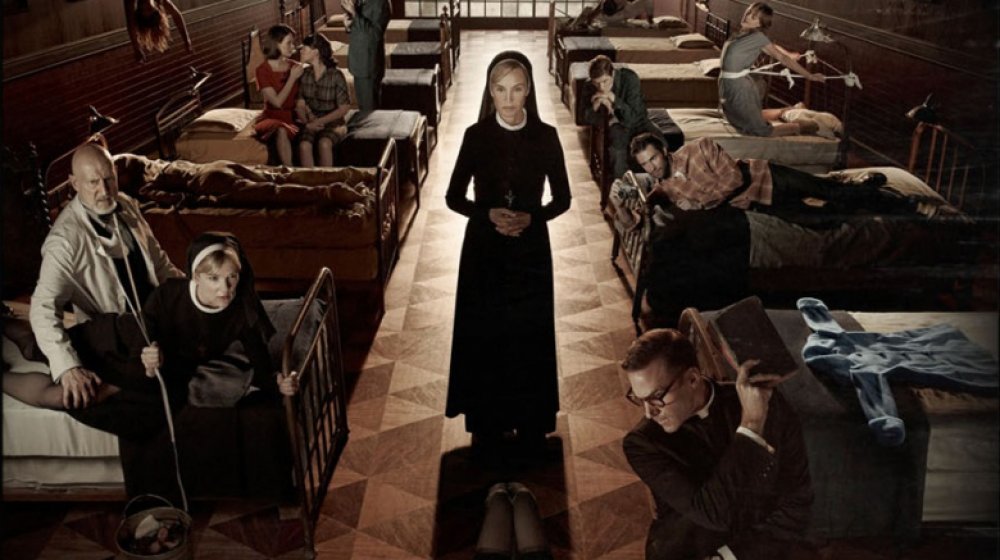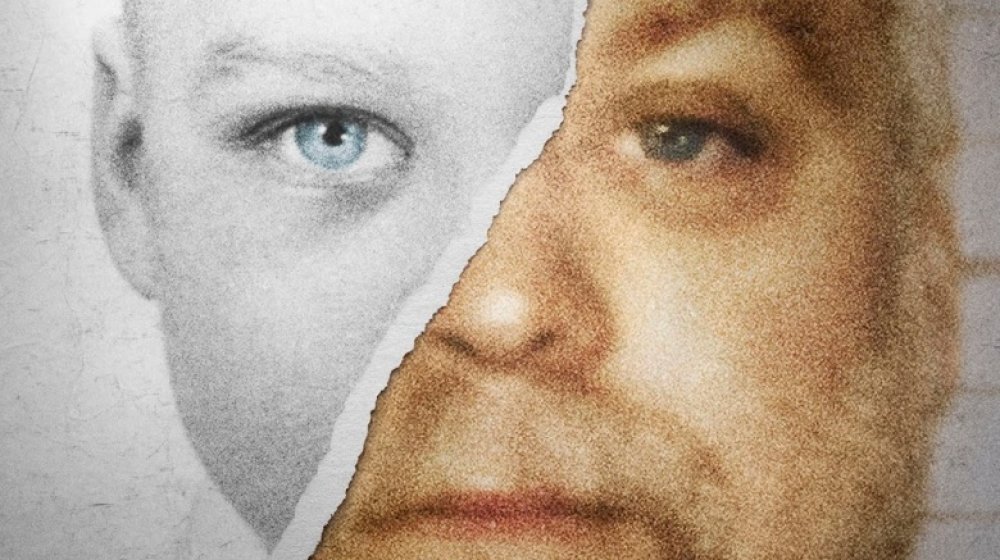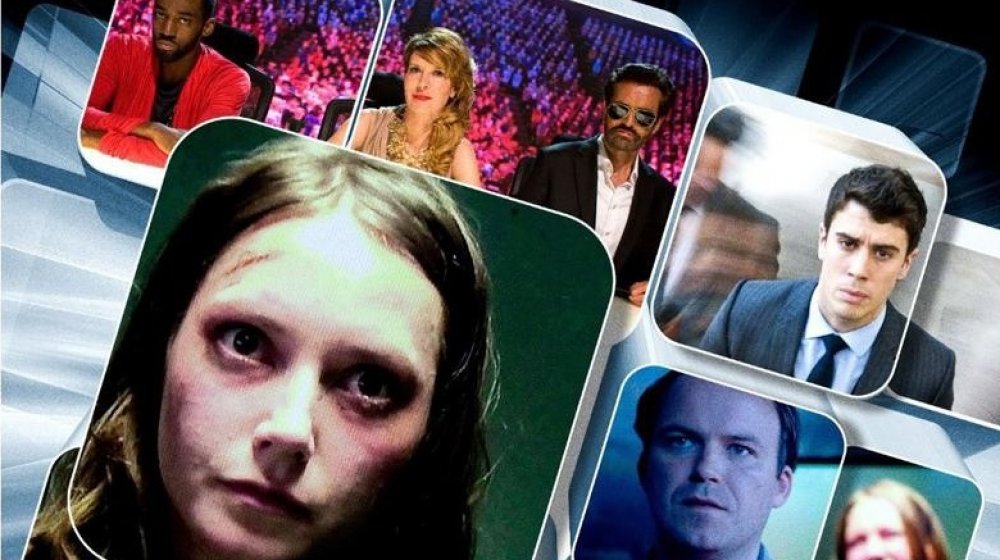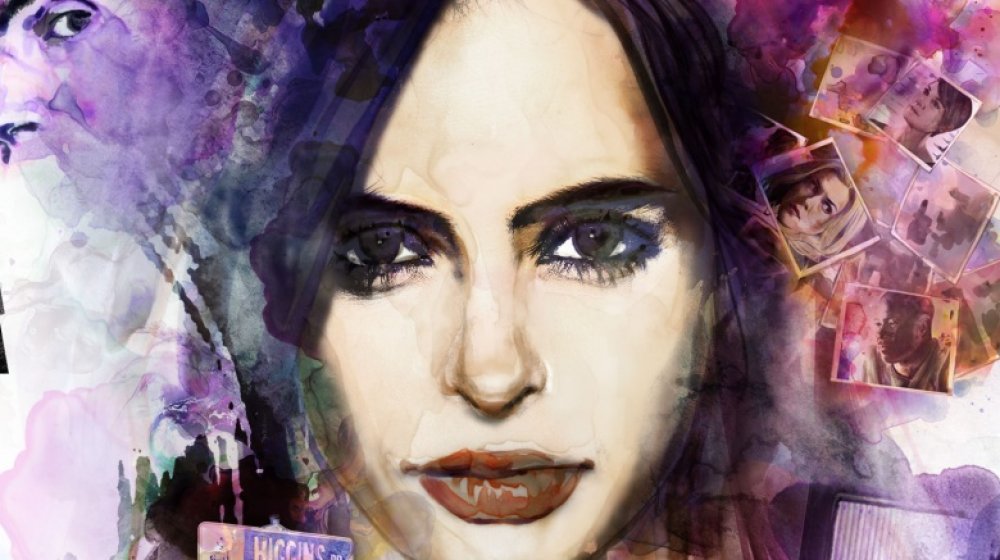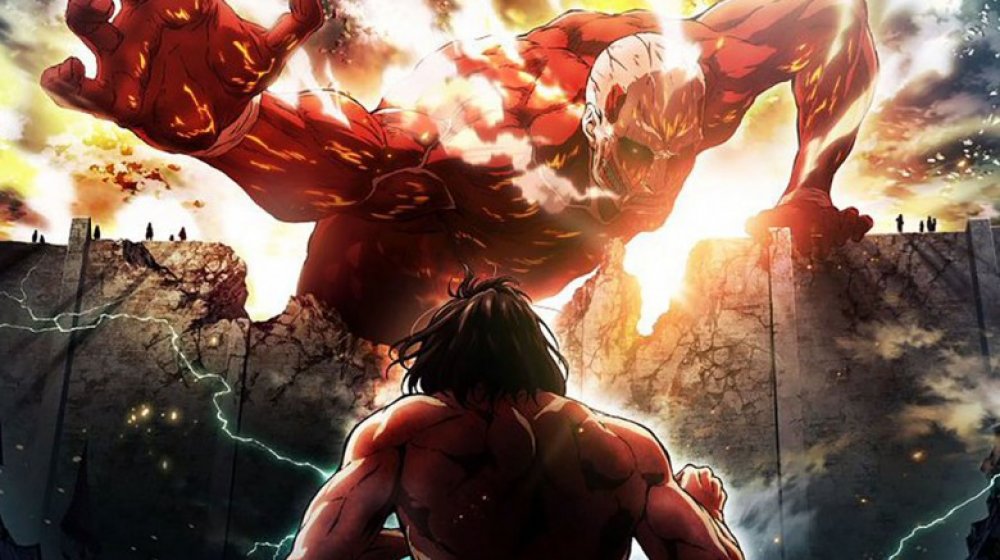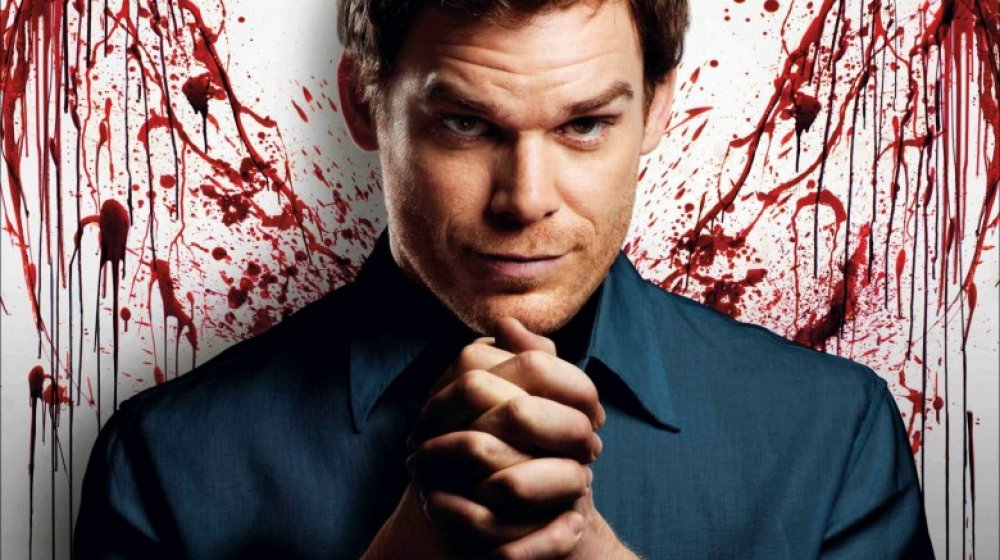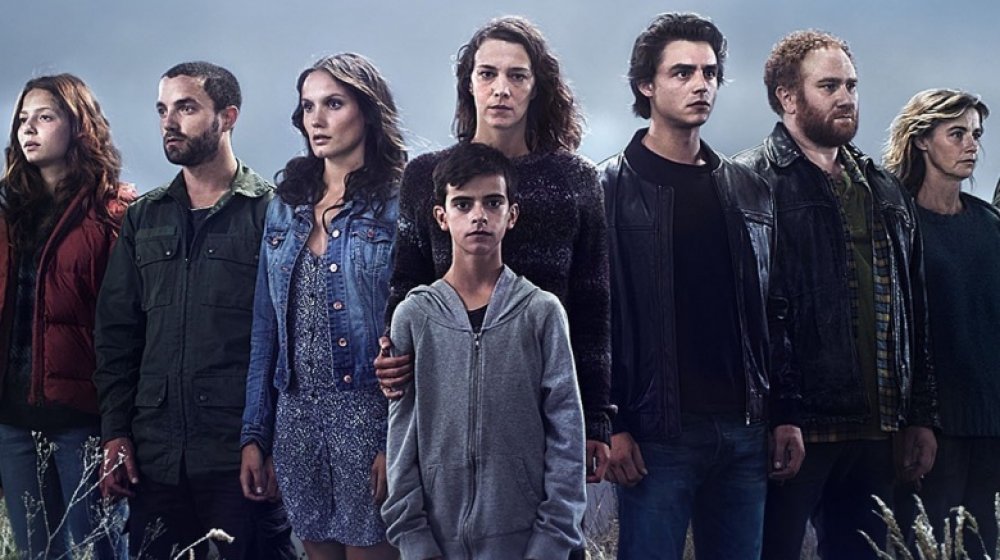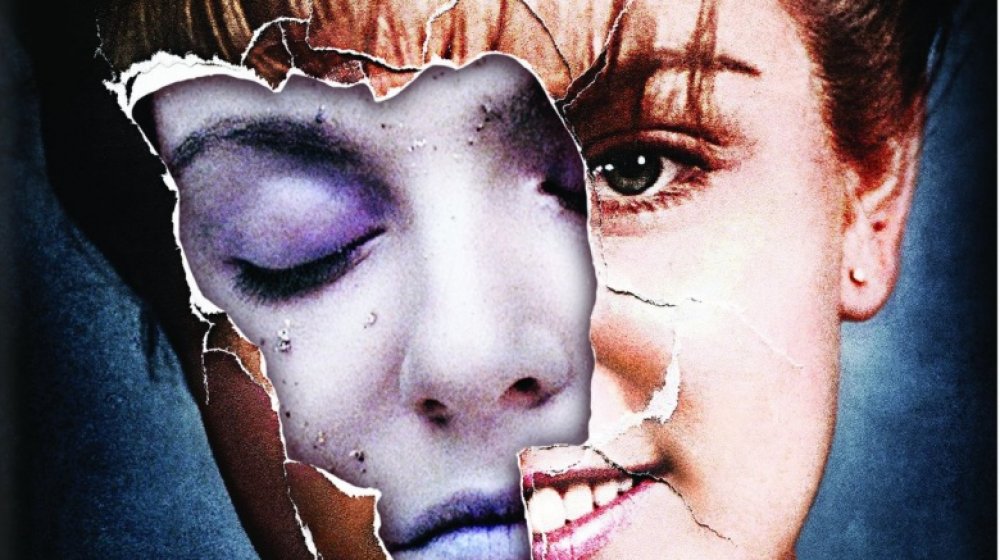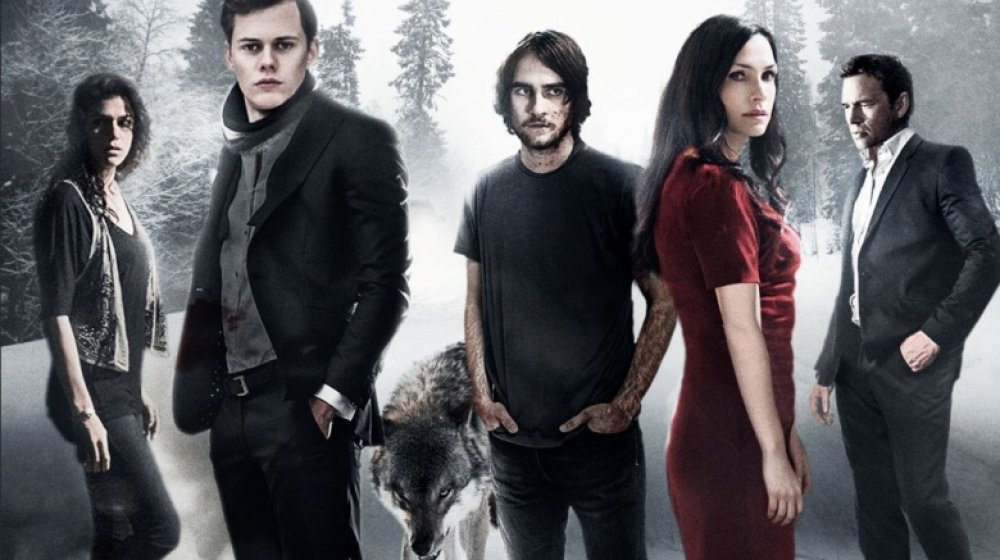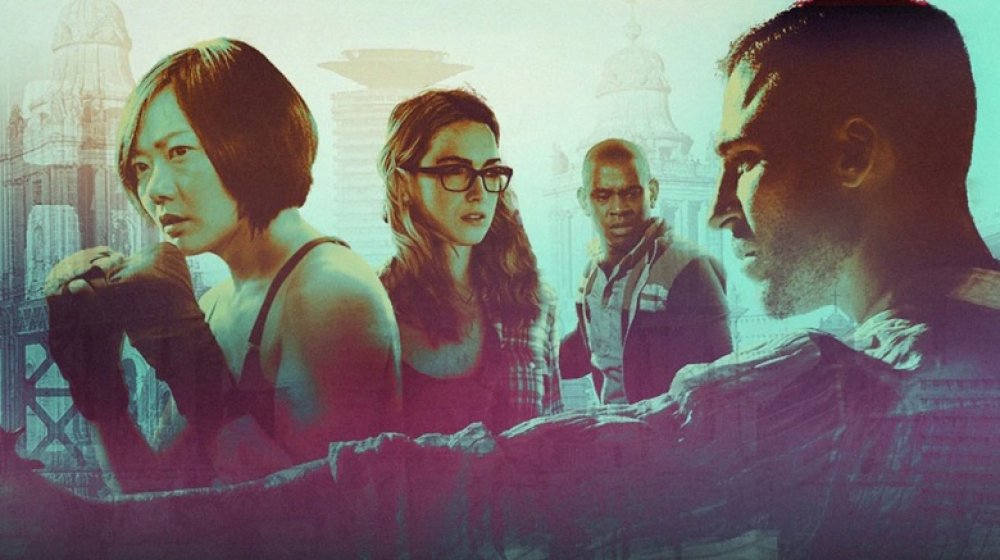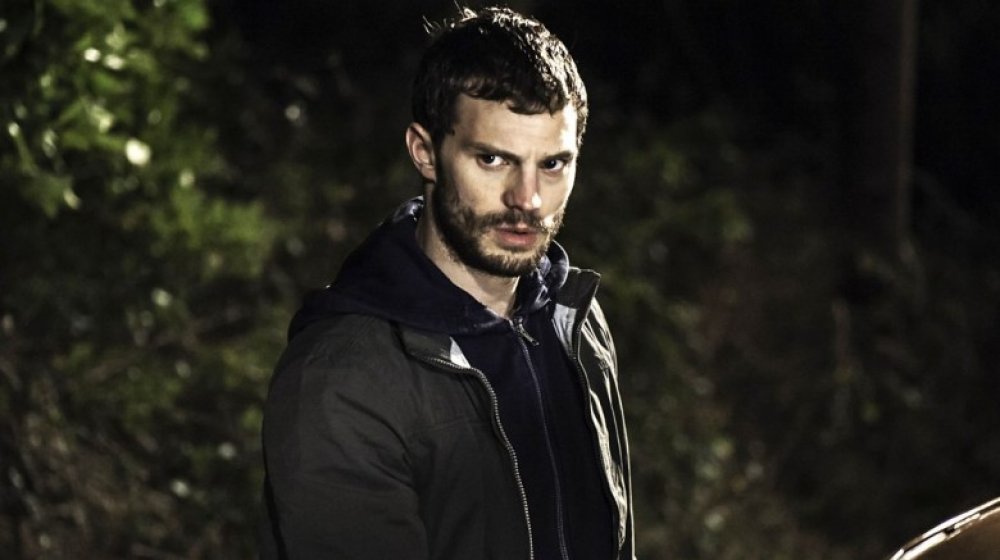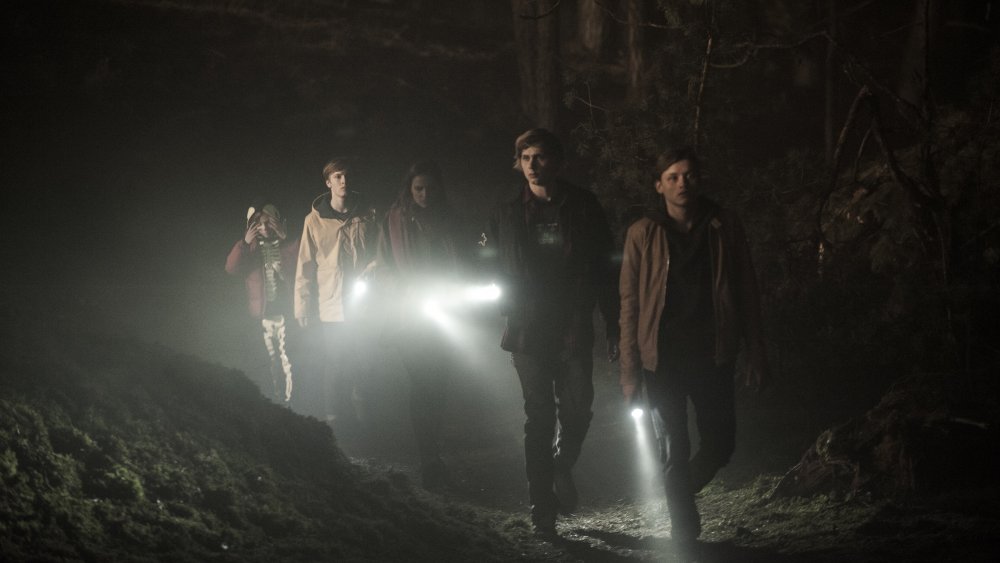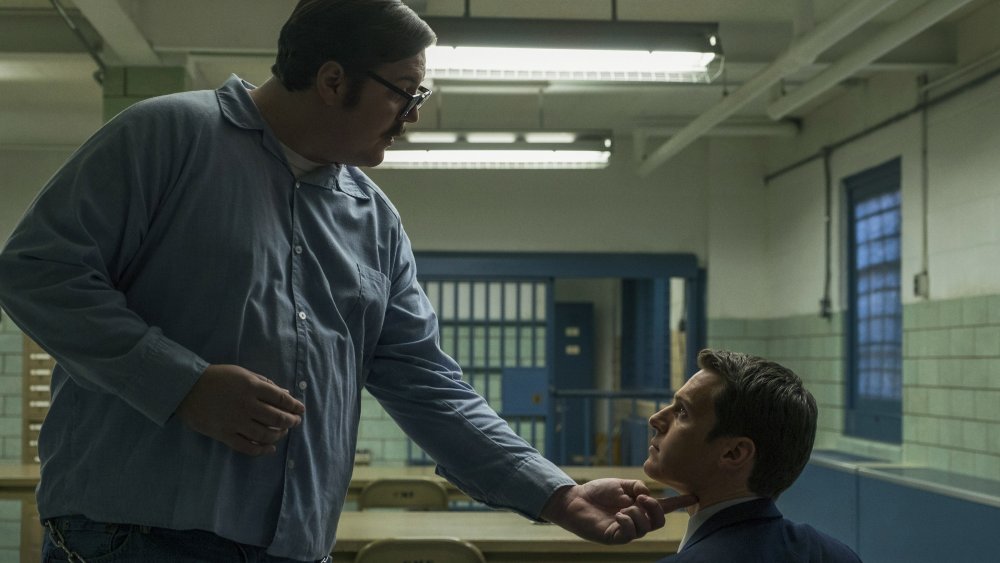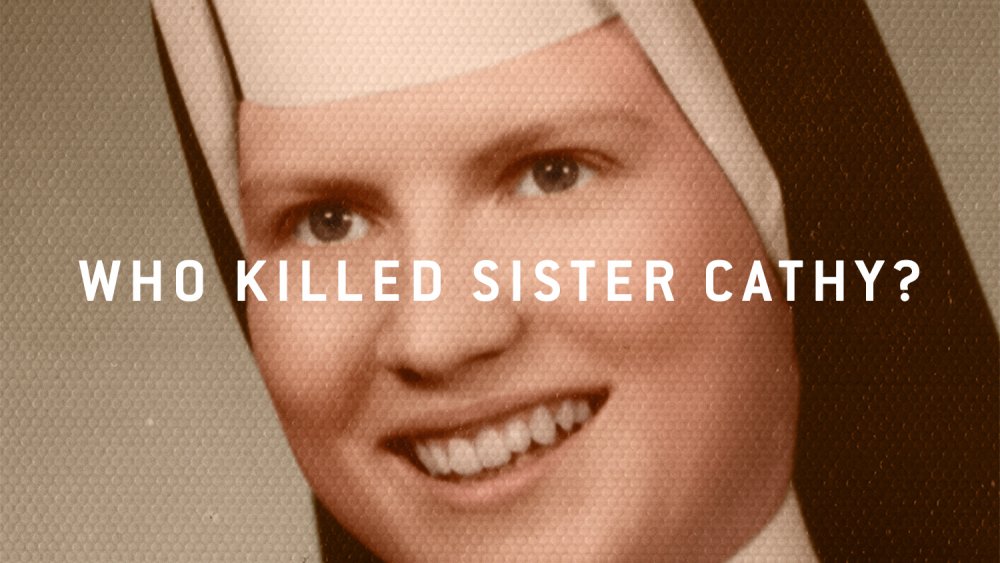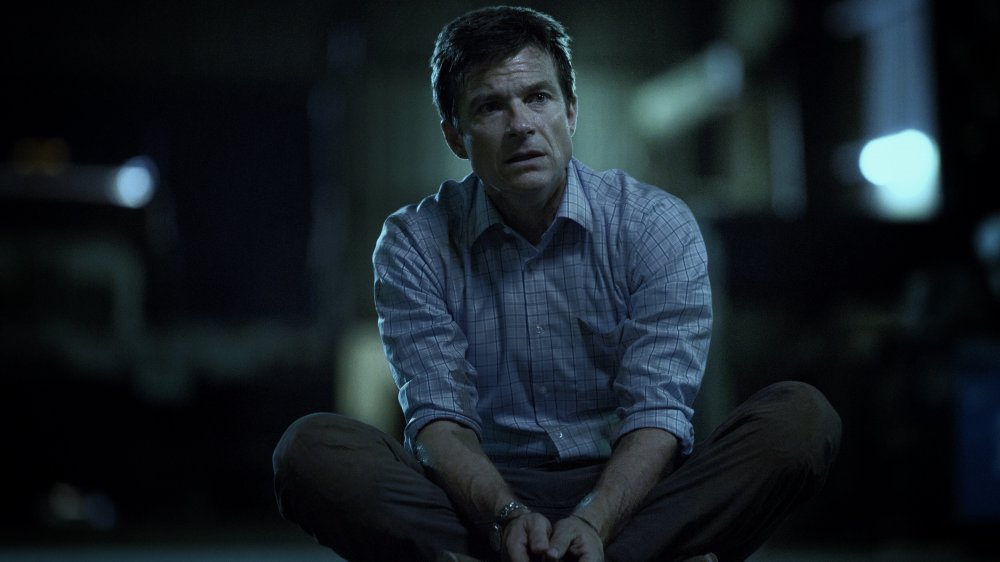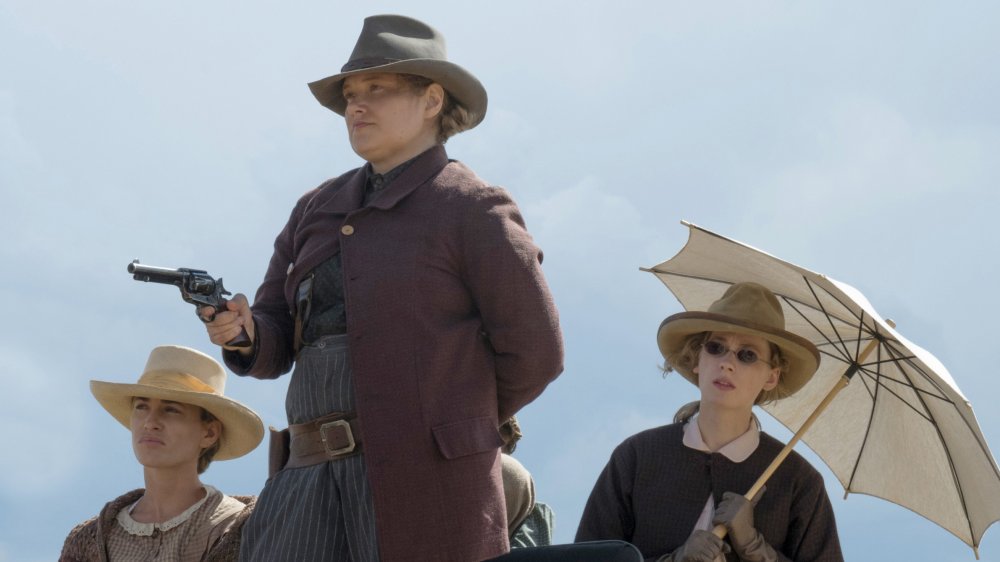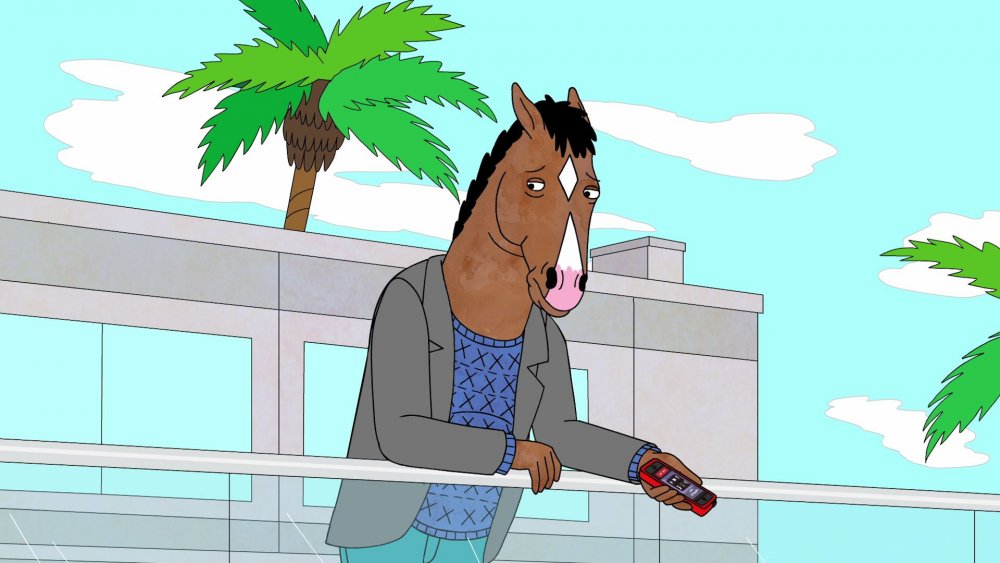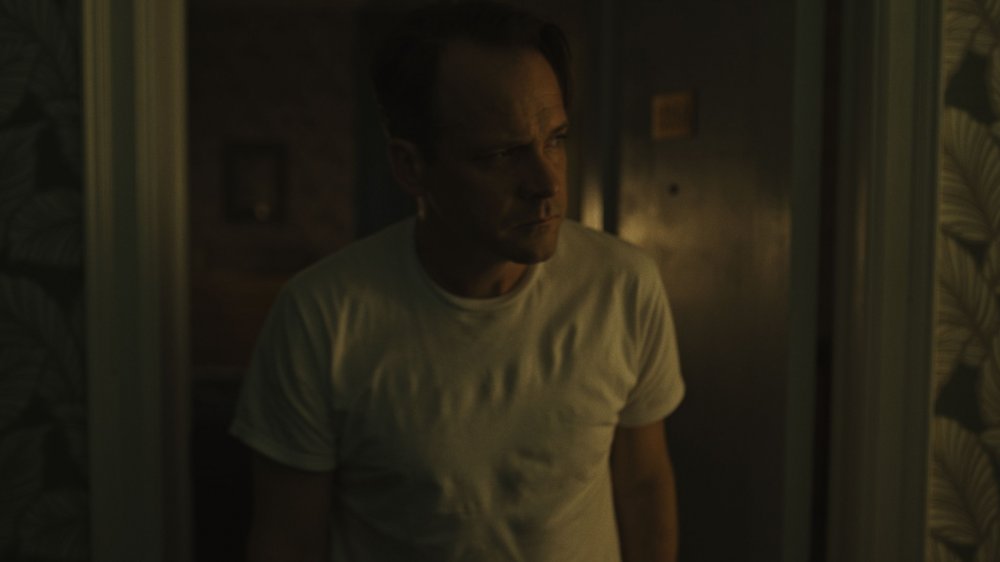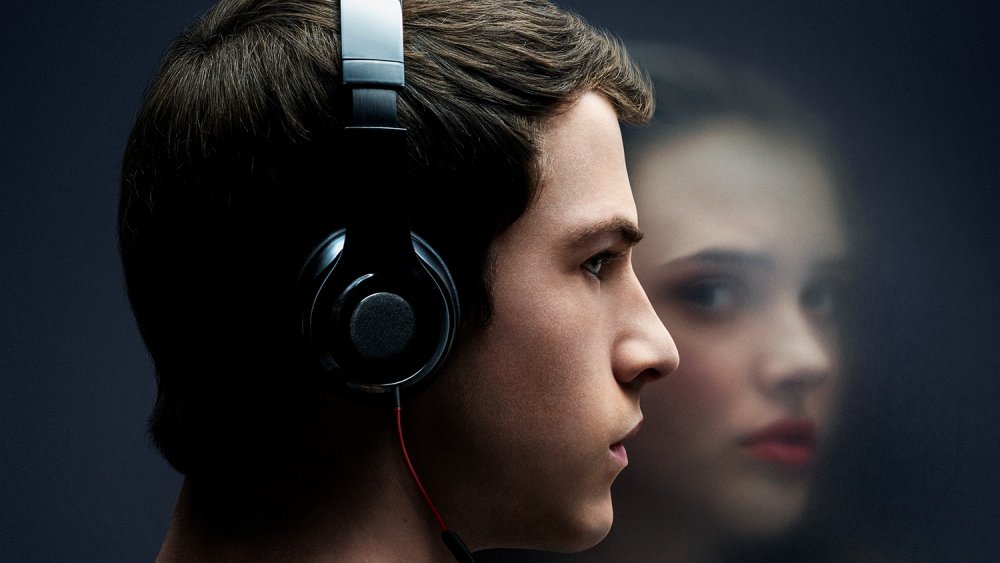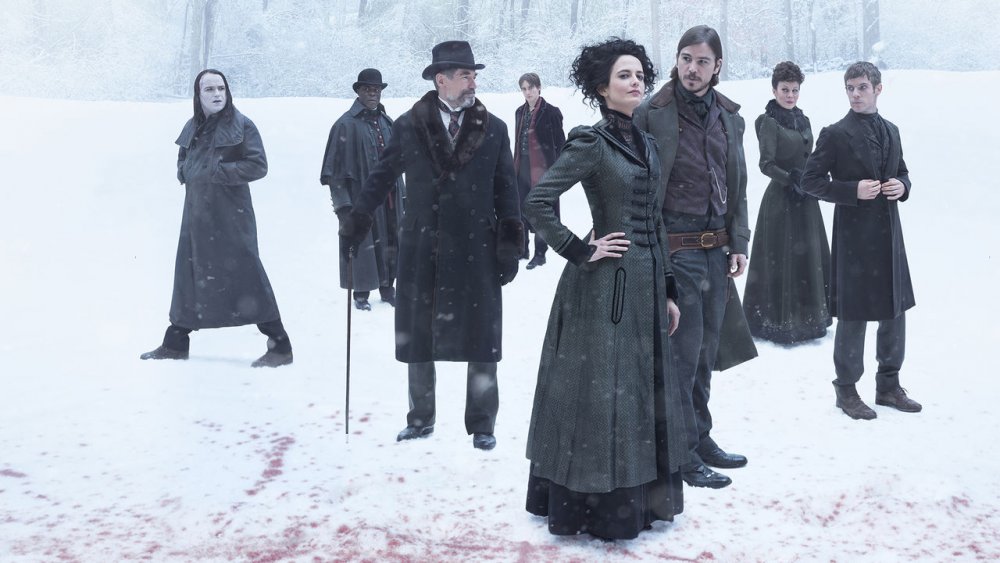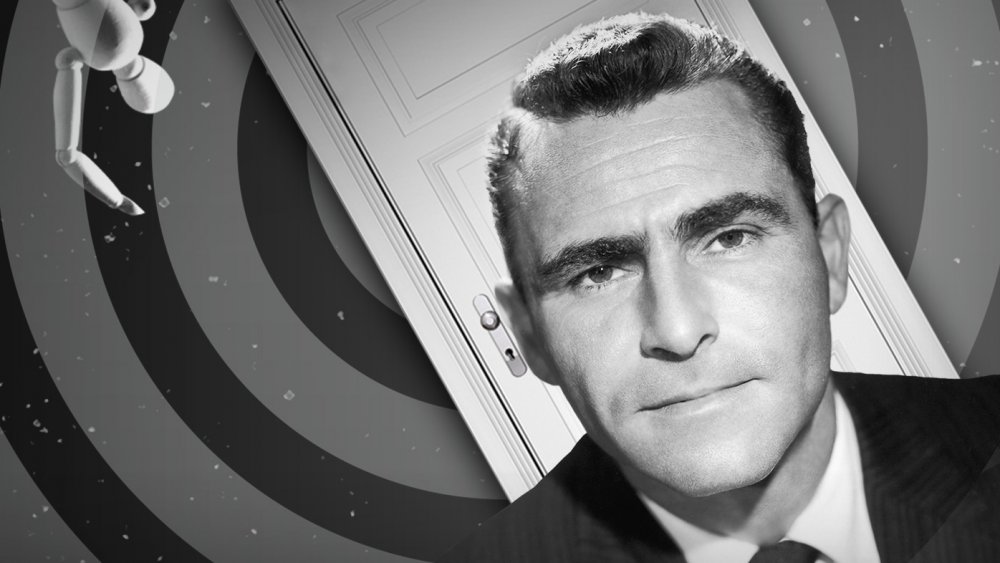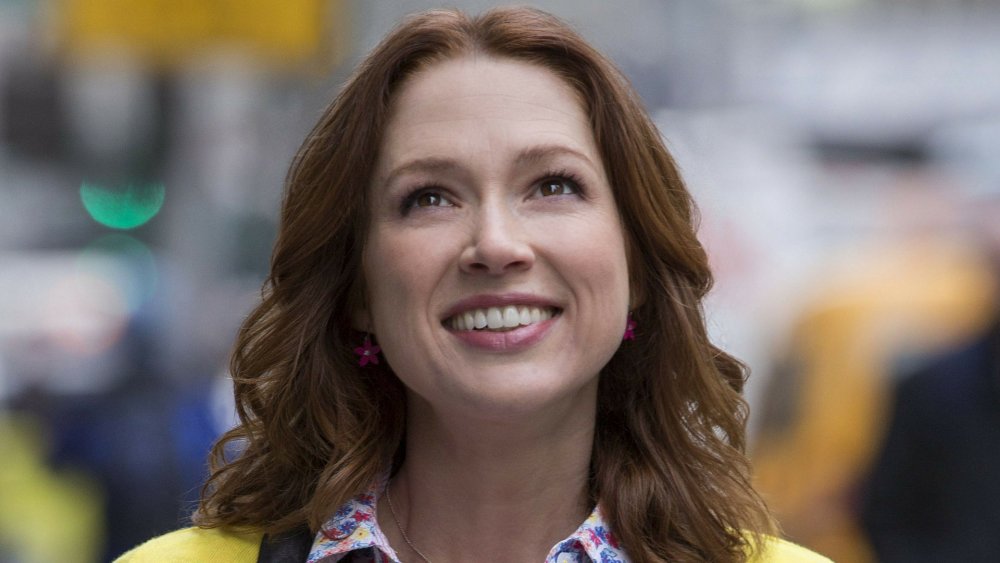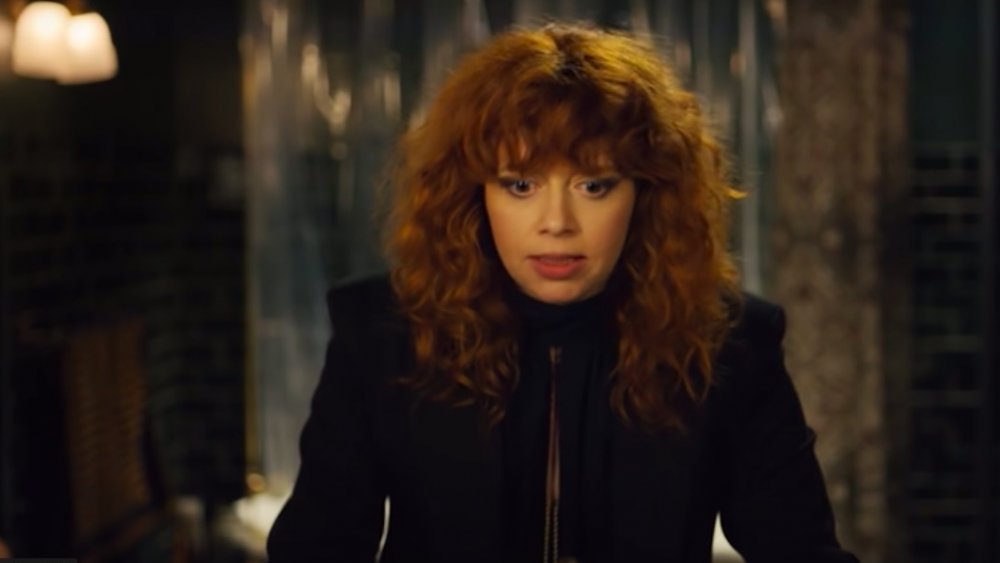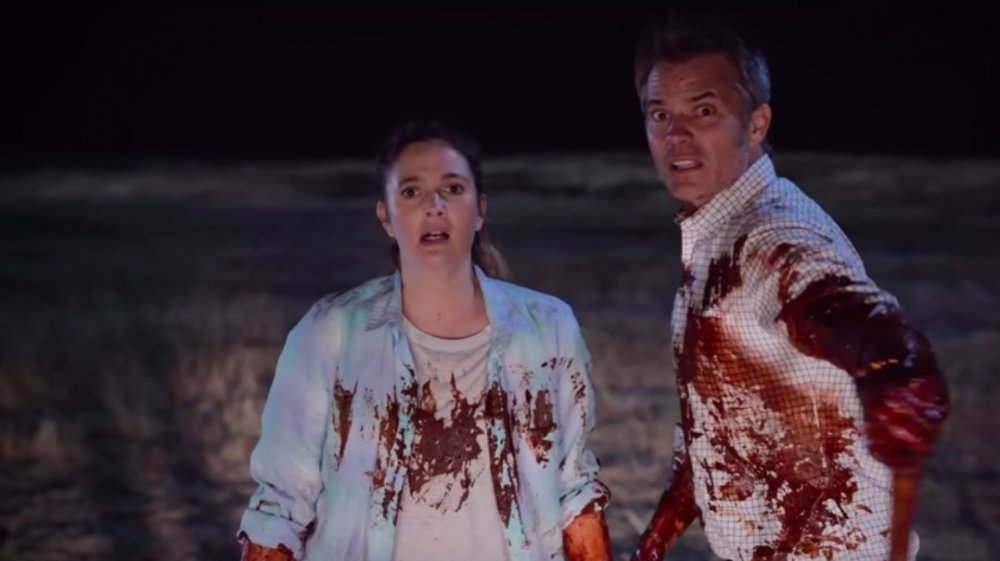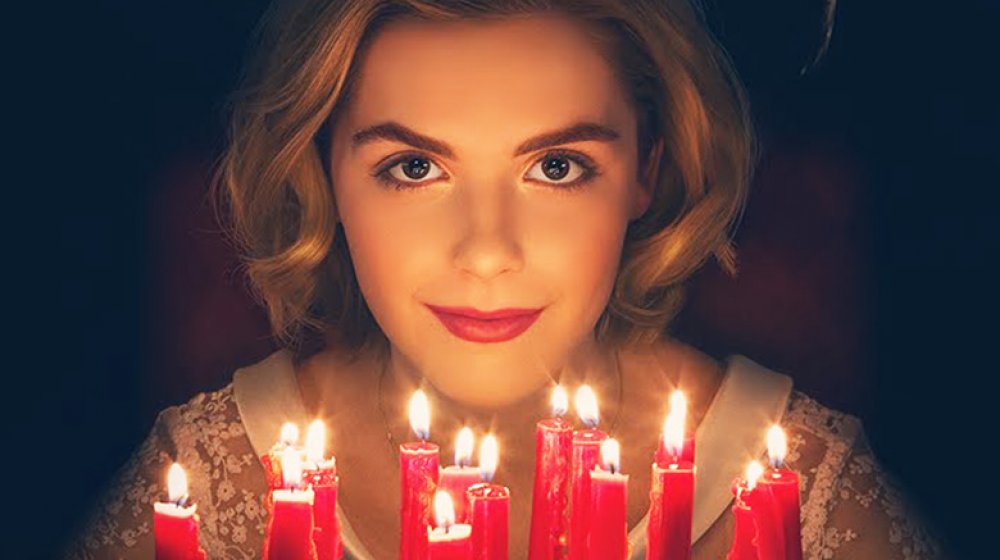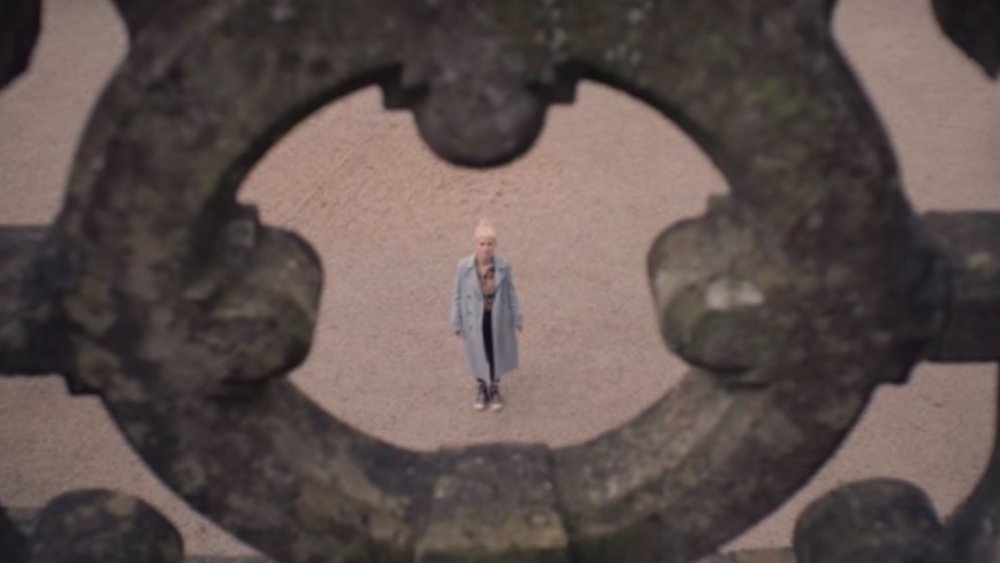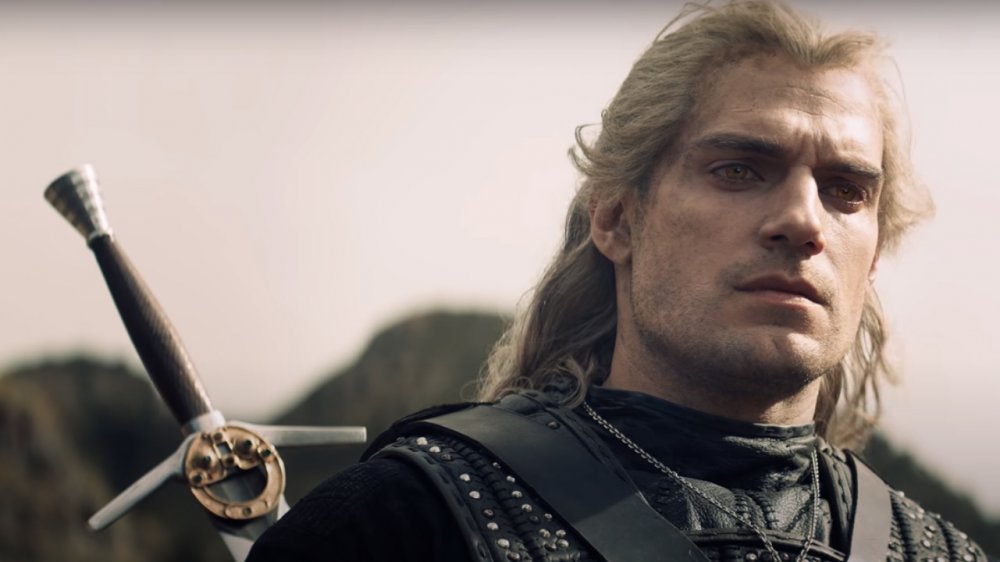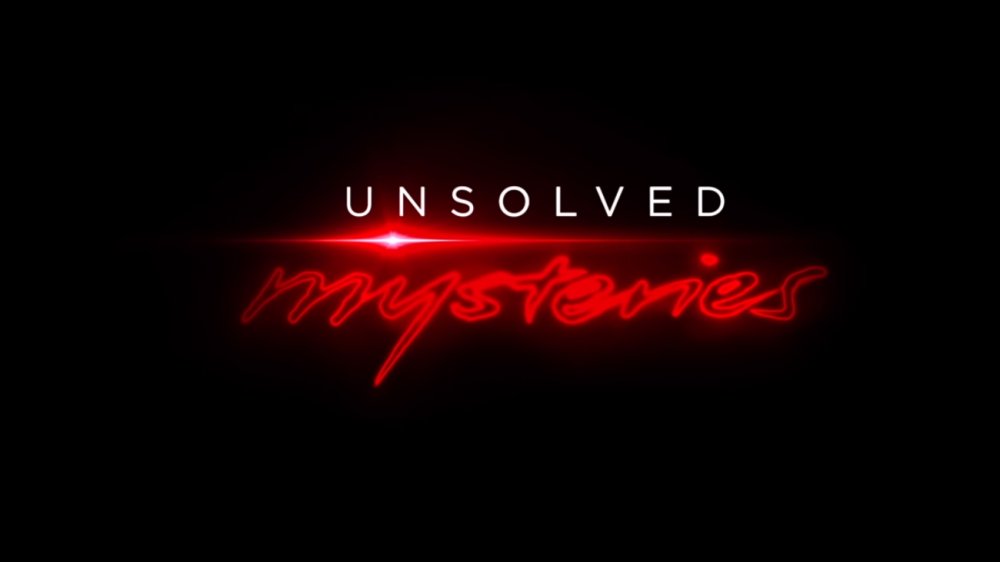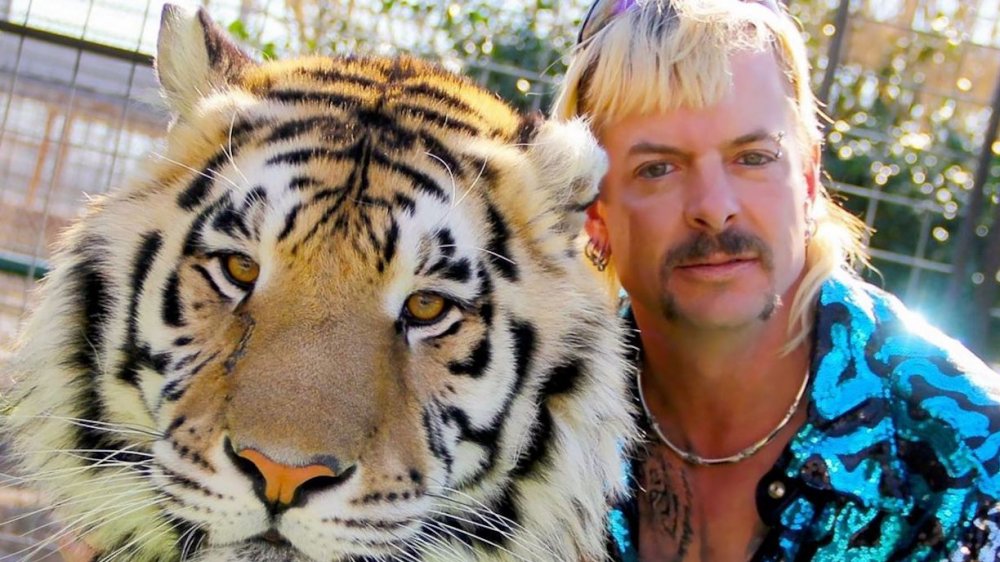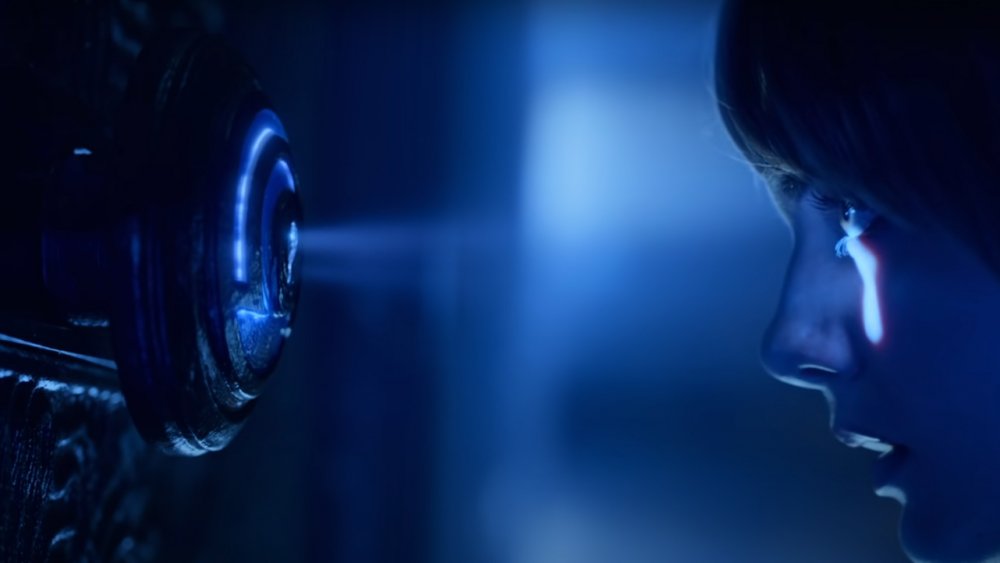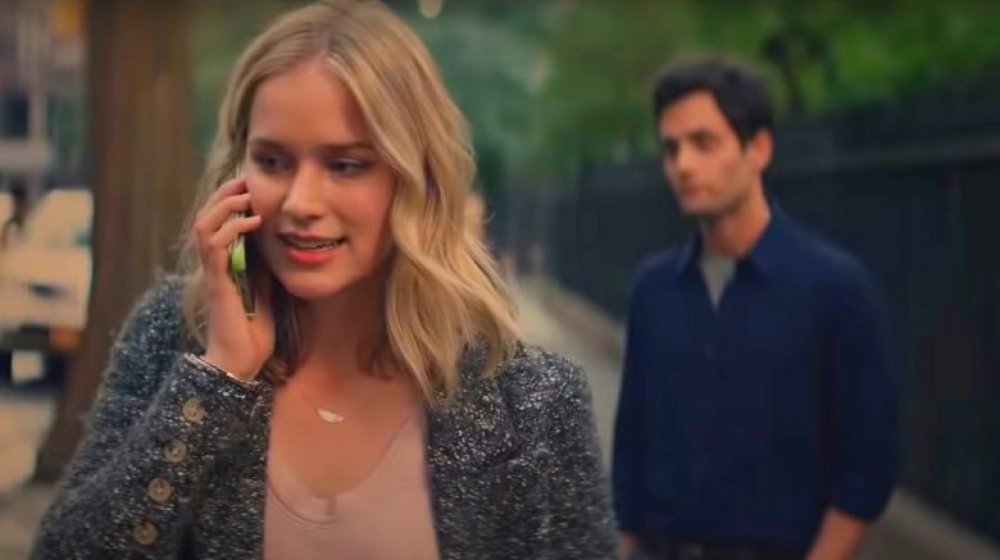The Darkest Shows You'll Find On Netflix
Netflix is an amazing repository of insanity, weirdness, and human suffering. Oh, don't get us wrong, it's also incredibly entertaining. But between their original shows and the decades worth of classic series available to binge watch, let's just say that the dark corners of Netflix are truly dark indeed. So what are the weirdest, darkest shows on Netflix? Hey, glad you asked...
Stranger Things
The first season of Stranger Things took the world by storm when it hit Netflix in 2016. The moody atmosphere, nostalgic '80s vibe, and rockstar performances (bandwagon shoutout to Winona Ryder, who disappears in that role. She's a ghost in that role, man), resonated with fans so well, the show was immediately picked up for a second season, followed by a third season.
And we get it, you've heard the hype over and over again — but this is one of those rare, once-in-a-decade shows that deserves every bit of watercooler praise. If you haven't dropped an evening on Stranger Things yet, give it a shot. If you have seen it, then it only gets better with a second viewing, if for nothing else than a rousing game of spot-the-reference.
The OA
The OA is a sci-fi mystery thriller that starts with a bang and just keeps on rolling. Playing out like the crossroads between Stranger Things, The 4400, and another hidden Netflix gem, Awake, The OA keeps things low-key, ramping up the intensity with each consecutive episode. But where The OA really excels is in its deft blending of genres, serving up healthy portions of sci-fi, fantasy, Hitchcockian mystery, and plain, hair-tearing questions, the kind that keep you hooked until the final episode.
Unfortunately, we can't tell you much about the plot — it's just one of those shows where knowing what happens makes or breaks it. Do yourself a favor and queue it up, then sit back and enjoy the ride.
American Horror Story
There's an idea out there that if it's mainstream, it can't really be true horror. And then there's American Horror Story, which totally and thoroughly disproves this forever. Yeah, it's been getting tons of media hype over the past few years, and has won loads of awards, including multiple Primetime Emmys and Golden Globes. But you know what? That's because it totally earned all the accolades and attention by being the creepiest and best horror show on television since, well, maybe ever. If you haven't watched it yet, take it from us: until you do, you really ain't seen nothing yet.
Making a Murderer
There's fictional darkness, and then there's that special kind of darkness that only happens when the story being told is all too true. The ten-part documentary series Making a Murderer follows the true story of Steven Avery, a man who was wrongly convicted of sexual assault and attempted murder and spent 18 years in jail before being exonerated. He wasn't free long, though, before he was again arrested and sent to prison for murder. But did he actually do it? Or has justice failed everyone a second time? Some horror stories are too scary to be fictional.
Black Mirror
The sci-fi/horror anthology Black Mirror is the spiritual successor to The Twilight Zone, only with modern stories, sensibilities, and effects. Originally debuting on England's Channel 4, it moved to Netflix for the third season. If you haven't had time to binge watch this series, you're missing out on one of the best and most acclaimed shows on TV, with an amazing cast that includes the likes of Jon Hamm, Hayley Atwell, Domhnall Gleeson, Rupert Everett, and Rafe Spall. There's nothing like it on television.
Jessica Jones
It may take place in the same four-color world as Ant-Man and Guardians of the Galaxy, but Jessica Jones is a universe apart in style and substance. A dizzying descent into manipulation and abuse, both physical and emotional, Jessica Jones pushes the boundaries not just of superhero television, but of television period. It's a knife cutting straight into the black heart of society's rape culture and exposing the darkness within the recesses of even the purest souls. It's a trigger warning with an itchy finger, so watch at your own peril.
Attack on Titan
Either you dig anime or you don't. That's cool. It's the way of things. But for every metalhead who's found himself grooving to a Nas track, and for every Hell's Angel who secretly wiped away a tear at the end of Love Actually, there's always someone who scoffed at Dragonball Z, then tripped into an anime show that they came away loving.
That show is usually Attack on Titan. The story of the last human survivors living inside a walled city to protect themselves from enormous, human-eating giants, Attack on Titan is a smorgasbord of rich visuals, explosive action (swords and jetpacks!), and some super-seriously dark themes. The downside? The episodes are so short (20 minutes), you find yourself clicking to the next one without thinking about it, and eventually you realize you've wasted a whole day, you're starving, and somewhere in the house there's a baby crying. Did you even have a baby before you started watching the show? Those freaking cliffhangers!
Dexter
Before Daredevil and Luke Cage rocked our Netflix queues, before American Horror Story let us revel in mainstream gore, there was Dexter — the original blood-splattered, serial-killing antihero and lovable goof. Starring Michael C. Hall as the affable maniac, Dexter premiered in 2006 and ran for eight solid seasons of well-meaning slaughter. It's darkly funny and hauntingly uncomfortable at the same time, a surgical hurricane that socks you in the gut and makes you beg for more.
The hook that snagged us for good: Dexter's practical concerns about the safety of eating while driving ... while he drives down the road to kill someone. That's just poetry.
The Returned
No, no, not the tepid American remake. The original French horror series The Returned, also known as Les Revenants, is the one to watch. But this doesn't have anything to do with Leonardo DiCaprio being eaten by a bear. It's actually much worse than that, as a number of dead people mysteriously return to life with no idea how or why. And then things start getting really creepy. Check it out, but don't worry about the subtitles; focusing on reading might be the only way to keep calm once the real terror begins.
Twin Peaks
Finally, you just can't have a list of the weirdest and darkest shows on Netflix without a shout out to the granddaddy of weird television, David Lynch's epic masterpiece Twin Peaks. We'd tell you what it's about, but after more than a quarter century studying it, we still have no idea whatsoever. Suffice it to say that major characters include a dead woman, a psychic log, and a mysterious spirit dwarf. Imagine American Horror Story with the craziness ratcheted up a hundred more notches and you'll start to get an idea what Twin Peaks is like. But the only way to truly know is to experience it yourself. What are you waiting for?
Hemlock Grove
Executive produced by horror master Eli Roth and based on the hit novel of the same name by Brian McGreevy, Hemlock Grove is an original Netflix series that delves into one small town's dark secrets. Turns out it's almost harder to keep those secrets buried than it is to keep the bodies buried, as both the revelations and the corpses begin to pile up. Oh, and there are werewolves. Yeah. Imagine True Detective crossed with H.P. Lovecraft and you'll start to get an idea of the show's tone.
Sense8
Not many people realize that Netflix had a collaboration between Babylon 5 creator J. Michael Straczynski and The Matrix masterminds Andy and Lana Wachowski. Not only is the show real, but you can binge watch it right now. Sense8 follows the story of eight people around the globe who suddenly develop a psychic link that allows them to tap into each other's knowledge, skills, and emotions. It's weird, crazy stuff—exactly what you'd expect from people who always deliver the unexpected.
The Fall
Biblical fact: Gillian Anderson can do no wrong. Between The X-Files, Hannibal, and American Gods, the woman is a force of nature, and one we wouldn't mind getting to know personally. And with that kind of line-up, you'd be forgiven for missing her in The Fall, yet another notch on Anderson's slim, gold-plated, Emmy-buckled belt. Are we hero worshiping? We're hero worshiping. Sorry about that.
The fact is, while Gillian Anderson is great in The Fall, it's Jamie Dornan who brings the show home as serial killer Paul Spector. If you're itching for another lightning-paced, hard-hitting crime thriller to fill the hours waiting for another (good) season of True Detective, look no further than The Fall.
Dark
Netflix's first original German-language show, Dark is the supernatural time-travel crime mystery series you didn't realize you were missing. Set in the dreary town of Winden, Germany, it sees the lives and relationships of four families thrown into disarray following the disappearance of two young children. Things get weird, and, through events that are best left unspoiled, the characters are thrust into a compellingly cryptic and creepy mystery that casts them across different time periods, including the 1980s. Think the demented lovechild of Twin Peaks, True Detective, and Lost, and you're about halfway there. This is a world of dark forests and dead birds and ugly secrets, where the skies are perpetually gray and the rain always pours.
If Dark brings to mind another horror-tinged, '80s-set Netflix original about children gone missing under supernatural circumstances, you're not wrong, but it's a comparison that only runs so deep. Where Stranger Things indulged heavily in period nostalgia and a healthy dose of teen and tween angst and camaraderie, Dark is a much drearier, weirder, and darker beast. It's a world steeped in personal tragedy and moral decay, and the ominous atmosphere is downright oppressive at times. But you know, in a good way.
Mindhunter
David Fincher and serial killers go together like glitter and unicorns, and with Mindhunter he delves deeper than ever before into those murky depths and the tortured psyches that populate them. Created by Joe Penhall and based on a true crime book by John E. Douglas and Mark Olshaker, this Netflix exclusive charts the early days of the FBI's forays into the psychological profiling of serial killers (or "sequence killers," as they they were referred to at the time), and the origins of the behavioral science unit that pioneered these methods.
Mindhunter's most chilling moments come about during dramatizations of real interviews conducted with prominent serial killers of the time, with dialogue adapted directly from actual recordings. The highlight among these is Cameron Britton's Edmund Kemper, who instills such a potent sense of creepy, articulate horror in his portrayal that you'll probably find yourself afraid to Google the real guy afterward. It's unsettling, fascinating stuff made all the more repulsive by the manner in which it resists embellishment and sensationalism, and the moody, obsessive, impeccably crafted stylings of David Fincher (who directed four episodes and executive-produced the show) can be felt throughout. It takes a minute to find its feet, but stick with it. If you like your darkness and gloom served cold, calculated, and painstakingly fact-checked, this is the show for you.
The Keepers
Like 2015's Making a Murderer, The Keepers focuses on an unsolved murder from the past (that of schoolteacher and nun Cathy Cesnik in 1969), it uncovers hidden truths and heinous injustices, and it provides a window into the lives of the real human beings caught up in it all. But The Keepers' concerns and implications are more far-reaching, more complex, and in many ways much graver. It's a more polished and accomplished work than Making a Murderer, and will it make you feel just as angry.
At first detailing the amateur investigation into the murder by two of Cesnik's former students, now in their 60s, Ryan White's seven-part series ends up peeling back layers of institutional corruption and unearthing years of systemic child sex abuse at the hands of a Baltimore reverend and other members of the clergy. Prepare to lose another large swathe of faith in institutional authority with this one and dive in. It is harrowing, horrifying, and essential viewing.
Ozark
Firmly planted somewhere between Breaking Bad's blood-soaked quirk and Bloodline's brooding sense of inevitable doom, Ozark is one big seedy ball of stress and gloom. Best known for his role on beloved sitcom Arrested Development, Jason Bateman plays family man, financial adviser, and reluctant money launderer Marty Byrde, who moves from Chicago to backwoods Missouri with his wife, Wendy (Laura Linney), and their family when his dealings with a Mexican drug cartel go about like those things usually go — badly. Bateman is a long way from Michael Bluth here, and he's fantastic as the hapless sap who's increasingly out of his depth. He even produced the show and directed four episodes and is probably in desperate need of a hug right about now.
There's some wit sprinkled throughout and the characters and their relationships are always compelling, but Ozark is a brutal watch at times, and the supremely graphic depictions of violence are particularly jarring. But then you wouldn't be reading this if that wasn't right up your sick, twisted alley, would you?
Godless
Westerns have a varied and illustrious cinematic tradition that hasn't always been successfully replicated on television. There are exceptions, of course. Shows like Lonesome Dove and Deadwood remain distinct and immortal, but in recent times the creative verve of the pure Western has grown a little stagnant in the world of TV. Enter Scott Frank, writer of Logan, Minority Report, and Out of Sight, who created, wrote, and directed all seven episodes of this weird and wonderfully unique Netflix original. This ain't your daddy's Western.
Godless is set in the small mining town of La Belle in the 1880s, where nearly all the men have recently died in a huge mining accident. This is where a merciless gang of outlaws (led by Jeff Daniels) and the young gunslinger they're pursuing (Jack O'Connell) find themselves, a town now almost entirely made up of women, and things spiral spectacularly from there. This is a brutal, bloody, and refreshingly thoughtful new show that wrings every drop of blood, sweat, tears, and wagon grease it can from its novel premise. The cinematography is stunning, the shoot-outs are thrilling, and the performances are top-notch. What are you waiting for, partner?
Bojack Horseman
It's hard to explain exactly how an animated comedy about anthropomorphic animals living and working side-by-side with humans in a satirical acid-flashback version of L.A. could be so deeply sad and genuinely thought-provoking. You really just have to experience it for yourself.
Bojack (Will Arnett) is a washed-up alcoholic and former 1990s sitcom star who, after years of debauchery and irrelevance, tries to reclaim a place in contemporary popular culture. His rival is a Labrador (Paul F. Thompkins), his agent is a Persian cat (Amy Sedaris), and his roommate is a slacker human (Aaron Paul). The show is laugh-out-loud funny and delightfully weird, of course, but what truly sets it apart from the herd is this grim, introspective, and occasionally nihilistic edge that genuinely sneaks up on you. What at first appears to be a sharp and wacky send-up of celebrity culture and society at large ends up becoming one of the most raw, honest examinations of depression on television. This thing goes to some genuinely heavy places and it's not afraid to risk its main characters' likeability. Give it a few episodes to get going and see for yourself. For a horse, Bojack is actually achingly human.
Wormwood
Directed by renowned filmmaker Errol Morris, this six-part documentary series tells the story of Eric Olson's attempt to unearth the truth behind the death of his father, Frank, a CIA scientist who fell from a hotel window in 1953. The details of his death are submerged in a swamp of lies, conspiracy, and LSD, and Wormwood uses this as a springboard to explore a multitude of theories, each more far-fetched yet more worryingly plausible than the last. It examines the much larger scheme that emerges, while ultimately focusing on the toll the investigation has taken on the son and the promising life he squandered in search of truth and justice. You won't find answers here, but that makes it no less spellbinding.
However, it's the dramatizations that really set Wormwood apart and launch it well and truly into the realm of weird. These aim to recreate the last ten days in the life of Frank Olson (played by the magnificent Peter Sarsgaard) in a wholly unconventional way that recalls iconic conspiracy thrillers of the 1970s. We see the same events multiple times from different perspectives with differing details and implications, muddying the waters of what we can ascertain as truth and creating what amounts to a surreal, paranoid waking nightmare of a confused and confusing time in U.S. history. Morris' approach to the material is odd and this is far from your average murder mystery, but his formal indulgences are warranted. This is a trip you need to take, pronto.
13 Reasons Why
Your mileage may vary with this one. Based on the bestselling YA book by Jay Asher, 13 Reasons Why was something of a sensation when it dropped on Netflix in the early half of 2017, though not always for the right reasons. The series charts the story of Clay Jensen (Dylan Minnette) who inherits a box of cassette tapes from classmate Hannah Baker (Katherine Langford) after she commits suicide. The tapes detail the reasons she did what she did, casting blame and threatening to destroy relationships in the process.
The show has been called dangerous by some, and condemned for romanticizing teen suicide. Netflix has even added additional content warnings to the show in response to the backlash. It's difficult to predict where any viewer might land on the issue. An irresponsible glorification or an honest, unflinching look at an important and difficult topic? It's undeniably well-made, emotionally raw, stylistically ambitious, and addictive as all get out. Just be sure to tread carefully.
Penny Dreadful
Artful Victorian horror is a difficult thing to get right, but you'd be hard pressed to find a more hearty stab at it than Showtime's Penny Dreadful. John Logan's series told a gloriously gruesome and macabre tale across three seasons, offering up genuinely effective frights, injecting new blood into classic characters (Frankenstein's monster, Dorian Grey, and Count Dracula among them), and looking dang good doing it.
But if there's one reason above all others to check out this sadly under-watched gem, it's the utterly captivating Eva Green. The whole ensemble is great but its her manic, disarmingly empathetic performance that single-handedly elevates the whole affair and allows it to aspire to something much more than just schlocky, well-lit chills. The bonkers (seriously, bonkers) seance scene from Season 1 alone should have cleared out the Emmys, if there was any justice in the world, and if the show doesn't have its hooks in you by that point it probably never will. Poor ratings led to an unceremoniously rushed and undeniably weak conclusion for the series, but still. This is a show that flies its freak flag high and proud, and it's well worth the rocky ride.
The Twilight Zone
Make way for the king! The sets are a little shaky, the effects are a little rubbery, and the stagey histrionics of the performances are probably an acquired taste now. But even decades after it first aired, The Twilight Zone has lost none of its resonance as a potent examination of the fear of the unknown, and the troubling ideas cooked up by Rod Serling and pals have only grown more disturbingly relevant as time has marched on. All these years later, The Twilight Zone is still in a class of its own in the world of weird.
Newer and shinier sci-fi anthology shows like Black Mirror and Electric Dreams might offer more intense thrills, more immediately recognizable technologies and modern production values, but The Twilight Zone perseveres and reigns supreme and continues to unsettle because of the sincere punch of Serling's moralizing, always grounding his fantastical stories in honest examinations of the human condition and reflecting the worst impulses innate in ourselves. This is a show that lives and breathes in any modern piece of sci-fi or horror that aspires to greatness, and there are impressively few duds across its 156 episodes. So open your mind, man, start humming that theme song, and take the plunge already.
Underground doomsday bunkers are funny (no, really)
This Netflix original begins when a SWAT team rescues four women from an underground bunker in a fictional town called Durnsville, Indiana, where they've been imprisoned for 15 years. So there's psychological drama, the tragedy of wasted lives, and the long, slow process of reintegrating into the modern world. Except, it's a comedy.
So yeah, there's nothing funny about false imprisonment. But somehow, Unbreakable Kimmy Schmidt, the story of a former bunker resident turned New Yorker, is equal parts disturbing and hilarious — the kind of thing you know you shouldn't be laughing at but darn it, it's hilarious and you can't help yourself.
Instead of hiding in Durnsville, Kimmy does what millions of people who aren't former prisoners of a doomsday cult wouldn't dare to do — she moves to New York. "I have to get my life back," she tells a former bunker mate. "Everyone in Durnsville is going to look at me like I'm a victim, and that's not what I am." So she sets out with nothing but some "mole woman" cash and a positive attitude and proceeds to get into the sorts of hijinks that only someone who is charmingly quirky, totally naive, and super-optimistic could manage to get into.
The Atlantic described this show, which ran for four seasons, as "cotton-candy humor [spun] around a world that's rotten inside." If that doesn't sound like fun to you, we're here to say that it kind of is?
Groundhog Day only with way more death
We know, Groundhog Day has been done. And done. And done again, sort of like an endless time loop that you can never get out of. But this take on the Groundhog Day formula — called Russian Doll — is a little different, and it's also really dark and funny.
In this version of the old formula, Bill Murray is not actually Bill Murray, but Natasha Lyonne, who you might remember from that one women's prison show that used to be good a really long time ago but then became unwatchable. Lyonne plays Nadia Vulvokov, whose time loop begins at her 36th birthday party. Instead of going to sleep at the end of the day and then waking up yesterday morning, she dies at the end of each time loop, and then gets tossed right back into her 36th birthday party. And the story diverges from the Murrayesque version of Groundhog Day even more when Nadia meets someone else stuck in a similar time loop, and the two of them set out to figure out what the heck is going on, only it's Netflix so they totally would never say "what the heck."
Russian Doll is full of hilarious death-jokes as the two eternally doomed characters try in vain to avoid getting killed for the billionth time, but it's also smart and human — Esquire called it "the first great show of 2019."
This zombie show is different, honest
Yes, zombie shows have been done. At this point watching zombie shows is sort of like dying and then coming back to life on an endless loop ... anyway, here's another zombie show but before you yawn and skip ahead, this one is a little different. The first twist is that the zombie is the star, and she's not actually rotting away or anything. The second twist is that the zombie is a real estate agent, and also she's played by Drew Barrymore.
The plot of The Santa Clarita Diet is basically this: A woman becomes a zombie, develops a hunger for human flesh, and her ever-loving and supportive family has to figure out how to kill people so she can feed herself while also keeping her job as a real estate agent.
If you can manage to sit through an entire episode of The Walking Dead without averting your eyes, you could probably manage to do the same thing with this show — but be warned, there's an awful lot of blood, intestines, and body parts. Just to give you an idea about how high the death toll actually is in this series, the Hollywood Reporter had this to say about the show: "Santa Clarita Diet may be the body disposal-iest show since Dexter, if not ever." So it's gross and bloody and still somehow manages to be a comedy about marriage and family in suburban America. Intriguing, right?
Sabrina the teenage witch only with Satan
Say goodbye to the cutesy Sabrina we know from the '90s and early 2000s. The Chilling Adventures of Sabrina is part Riverdale and part American Horror Story. 1990s Sabrina was basically just a teenage girl who cast the sorts of spells that any 1990s teenage girl stereotype would cast if she suddenly found herself with magical powers — you know, like magically sizing herself down to fit into a too-small dress and changing the weather so she doesn't have to miss her flight to Jamaica. This Sabrina has much bigger problems. She has to choose between having a normal life and joining the Church of the Night, which is literally a terrifying, uber-powerful, devil-worshiping religious cult. If she chooses the devil-worshiping religious cult, she will have to give up her free will. But you know, superpowers, so it's a conundrum.
According to USA Today, Sabrina is designed for binge-watching. There are lots of cliffhangers, which will make you do the whole "Just one more episode ... wait, is it really four in the morning?" thing that bingeable shows always make you do, but at the same time there are some self-contained episodes, which isn't common in 10-episode series. And fair warning for the sensitive: This is a show about a teenage witch, but Common Sense Media doesn't recommend it for kids under 15. And it's a show about people who worship Satan, so be prepared for some, you know, Satanism. You have been warned.
Some more serious darkness
Dark shows that have a humorous twist can sometimes be more palatable than shows that are just dark, full stop. After you've just lost your 27th favorite Walking Dead character to a pack of the undead and a revolving door, sometimes you just want to watch a real estate agent snacking on some guy's arm. But darkly serious shows are important, too, because they remind us that death and supernatural peril can't always be fun and games and sometimes you just need to be cool with the fact that the unfunny forces of darkness are coming to get you.
Requiem is that kind of show. It's a British import about a young musician who travels with a friend to a small town in the Welsh countryside to try to solve a mystery she thinks she might be connected to. The show starts out more like a basic mystery and gradually gets more intense and scary over the course of its six episodes.
IGN calls Requiem "a tense, psychological horror series" and warns viewers that there isn't really any classic horror — no bad guys with axes or slimy alien creatures, just a lot of super-scary, psychological suspense and also terrifying mirrors. If you'd rather cower in one corner of your sofa and bite your nails than laugh over the hijinks of a zombie realtor and/or a woman who keeps hilariously dying over and over again, then you'll probably be pretty satisfied with Requiem.
Game of Thrones but without the bitter disappointment
The producers of Netflix's The Witcher weren't exactly cagey about how dark and weird their story is — they opened the series with a scene in which the title character fights a giant spider. That's not exactly super original, or anything (Harry Potter, The Lord of the Rings, a million different lame horror movies about giant spiders), but it did put the viewers' expectations in the right place. Geralt, our hero, is a monster hunter, a white haired, sexy monster hunter with a smolderingly deep voice who only sometimes has weird black veins all over his face. According to The Verge, the show is based on a series of novels by Polish author Andrzej Sapkowski that also spawned a bunch of popular video games, so it had a ready-made fan base right out of the gate and has attracted a horde of additional fans, most of whom are broken and betrayed former Game of Thrones fans looking for a series that might do something other than waste eight whole years of their lives.
Anyway, The Witcher has dark humor, lots of bloody, gag-worthy violence, and plenty of, you know, scenery. Gerald not only fights monsters but also bigots, because the people 'round these parts don't want his kind in their pubs. In fact, as the show progresses, it becomes clear that the monsters aren't really as evil as some of the people are, which is a trope, granted, but one that works in this format.
Unsolved Mysteries but without the 800 number
There's something about the 1980s. Big hair, leg warmers, The Dukes of Hazard – if you grew up in the '80s, that stuff makes you feel a bizarre range of emotions from nostalgia to a mild sense of mortification, and it's awesome. Fortunately, there are plenty of television producers who recognize that there's just something about the '80s that makes people want to sit down on an overstuffed sofa and relive the good ole days.
Netflix's latest hit is a reboot of the classic 1980s series Unsolved Mysteries which has all the suspense of the original but lacks the re-enactments and narration that were kind of its trademark. Instead, this new version relies on the voices of witnesses, creepy footage of crows flying around old buildings, ominous piano music, and a ton of slow-motion drone footage. Like the original, viewers don't get any closure at the end of the story, only a tip line (except that it's a URL instead of an 800 number, because this ain't the '80s anymore).
It will be a while before we know whether the new series actually helps solve any old mysteries (the old one is credited for helping close more than 260 cold cases), but in the first couple of weeks, law enforcement says they got more than 2,000 tips including 20 that were "credible," according to Refinery29, so cool. You can get your creepy programming fix and maybe be a Good Samaritan, too.
The tigers aren't even the weirdest part
Right around the time America went into lockdown, its bored, isolated citizens discovered Animal Crossing and Tiger King. Some people also baked bread, but for the most part, no one wrote a great American novel or did anything useful because Animal Crossing and Tiger King. Animal Crossing isn't a Netflix show, but we can talk about the dark and totally addictive documentary that riveted the world for like less than a day because that's how long it takes to binge-watch all eight episodes when you're in lockdown.
Tiger King is so bizarre and unbelievable that some people were confused as to whether it was actually a mockumentary, because, let's face it, it runs a bit closer to Spinal Tap than The Fog of War. The show follows the train-wreckishly charismatic Joe Exotic, his collection of big cats, his polygamist spouses, and the part where he tries to hire someone to kill Carole Baskin, an animal rights activist who's got something against poor Joe and his entire tiger kingdom or whatever it is.
Weirdly, Joe Exotic — who was actually convicted of the murder-for-hire plot and is now serving 22 years in prison, per Slate — gets played up as a sort of anti-hero while Baskin gets drawn as the villain. And yet, this became one of the most binged shows of 2020 because everyone loves a train wreck, and when it's a polygamist, tiger-owning would-be murderer, well, pass the popcorn.
If we just add an "e" at the end of "Lock," then the title won't be stupid anymore
Locke and Key is part The Lion, the Witch, and the Wardrobe, part The House with a Clock in its Walls, and all kinds of weird. The story follows the Locke siblings, who move into a creepy old mansion called Key House, but don't let the stupidity of the title put you off the show, or anything. Also, don't let the fact that the whole "hapless family moves into scary mansion" premise has been done and done put you off the show, either, because somehow, showrunners managed to reinvent that old trope and make it not only watchable but disturbingly fun.
Key House is full of — you guessed it — keys, but these aren't ordinary keys. They're keys that whisper, and when they're found, they unlock doors that lead to scary places, like the land of the dead, the inside of your skull, and pretty much everywhere but Narnia. There are also demons, fire, and children running around totally unsupervised, so yeah, there's something to play into just about everyone's fears.
For all its tropiness, Locke and Key is still pretty unique, and not just because of the extra "e" in the title. If you liked A Series of Unfortunate Events, you'll like this equally sinister tale of clever kids battling evil and not being scared of things that would make most children revert back to diapers and move permanently into their parents' bedrooms.
Creepy stalker romance?
So first there was 13 Reasons Why, which made suicide seem cool (bad Netflix, bad) and now there's You, which puts us rather uncomfortably inside the head of a stalker. Except, You manages to avoid the same traps as 13 Reasons Why – there's nothing cool about what stalker Joe is doing, and his behavior is genuinely terrifying for those of us looking in on his psychopathic inner world.
The object of Joe's obsession is a girl named Beck, and of course Joe can't just admire her from afar. Nope, he has to show up as a creepy reflection in the window just inches from her oblivious face and hang around behind her while she's in the library, mostly so showrunners have some good still images to use in banner ads, but anyway. At one point, Joe compares himself to the leading man in a romantic comedy, after he breaks into Beck's house and starts rifling through all her stuff.
Joe isn't all bad, though. And the fact that he's almost — almost — likeable makes this all even grosser and harder to stomach. Also problematic is Beck's choice of friends and acquaintances: She surrounds herself with a lot of deplorable people, which makes for riveting, if emotionally confusing, television. Happily, You never crosses the line between "stalking is bad" to "stalking is romantic." You can't really say the same about a lot of other romantic comedies. (We're looking at you, Love Actually).
